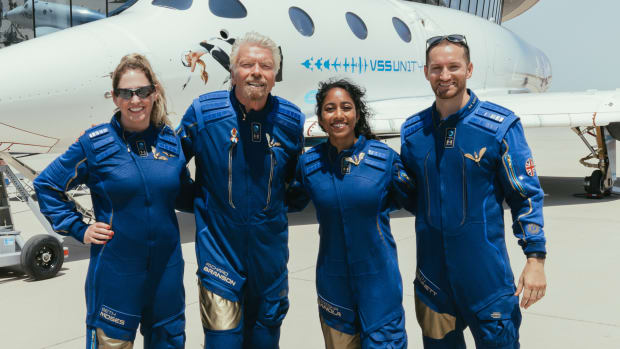One financial frenzy seems to have died down.
Special-purpose-acquisition vehicles, or SPACs, had been seen as the streamlined answer to the administrative morass that is a standard initial public offering.
SPACs are no longer trendy. And it's their king who has so decreed.
Star venture-capital investor Chamath Palihapitiya, an early executive at Facebook (META), almost three years ago helped make SPACs the buzzword in business circles.
On Oct. 29, 2019, Sir Richard Branson's space tourism company, Virgin Galactic (SPCE), made a grand entrance on Wall Street after merging with Palihapitiya’s venture, Social Capital Hedosophia.
A SPAC, also known as a blank-check company, raises money to acquire an existing business and take it public.
The hardest part is finding the right company. In the case of Virgin Galactic, Palihapitiya's company had acquired 49% of the firm and enabled it to become the first space-tourism company to be listed on a stock exchange.
Liquidation of Two SPACs
For its grand stock-market debut, Virgin Galactic had been applauded by investors: During the first trading session, the shares touched a gain of more than 10% over their introductory price of $11.75.
This success was also explained by Palihapitiya's eloquence on television shows and in media interviews. He managed to easily convince investors that SPACs were the future and traditional IPOs were the past.
A SPAC "actually allows you to raise a really large amount of money, to go to a broad base of institutional investors, and it allows you to tell them what you think the future can look like," the investor told TechCrunch in October 2021.
He was then dubbed the "Pied Piper of SPACs” by The New Yorker and the "King of SPACs” by Bloomberg after he raised money for at least 10 SPACs.

Today, Virgin Galactic's shares are trading around $5, half where they were. This fall results not only from investors' concerns about the economy's health but also from the slump in SPACs that's been going on for several months.
Palihapitiya himself seems to confirm this. He's just said that he was going to shut down two SPACs that had raised $1.15 billion and $460.7 million respectively, according to regulatory filings. And that's because the SPACs did not find suitable companies to take public.
"Today, we started the process of winding down IPOD and IPOF," the investor said in a Sept. 20 blog post that you can read here.
"This means that the funds raised by IPOD and IPOF will be returned to their respective shareholders."
"Over the past two years, we evaluated more than 100 targets, and while we came close to doing a deal several times, we ultimately walked away each time for a couple of reasons," he added.
No Suitable Target
He explained that neither of the two blank-check companies found a firm with an acceptable valuation, and the managements of the companies approached were unwilling to go public in the current volatile conditions.
What is surprising is that Palihapitiya then seems to make a sort of assessment of his adventure in SPACS, as if he no longer really believes in the bright future for blank-check companies.
"Looking back, I am proud of the companies we helped bring public – Virgin Galactic, Opendoor (OPEN), Clover Health (CLOV), SoFi (SOFI), ProKidney (PROK) , and Akili AKLI," the investor said.
"They are well positioned to bring innovation to each of their end markets over the next several years, and I am proud we were able to have played a role in each of their respective journeys."
"Looking ahead, our focus remains on investing in big ideas at the early stage. Our view on SPACs remains consistent since our first deal – SPACs are just one of many tools in our toolkit to support companies as they enter subsequent stages of growth.
"Meanwhile, we are continuing to search for targets for the two remaining vehicles in our Bio 2.0 platform."
Is It the Beginning of the End?
Other finance stars recently shut down SPACS and returned the money they raised to investors. This is the case of billionaires Bill Ackman and Sam Zell.
In addition to the upheavals shaking the financial markets due to inflation, which is at its highest in 40 years, the blank-check companies are also affected by tighter regulation plus criticism that they lack transparency.
One of the rules for SPACs is that they must find a company to merge with within 24 months of first raising money from investors. This delay also includes review of the transactions by the Securities and Exchange Commission.
The liquidation of two blank-check companies by Palihapitiya appears "to sound the end of an era with the current SPAC cycle coming to a grinding conclusion as a new one sets to begin in 2023," concluded Spacinsider, a provider of SPAC data and analysis.







